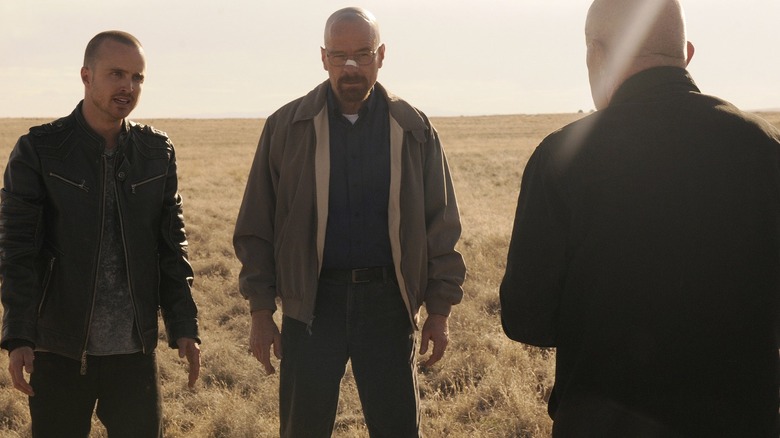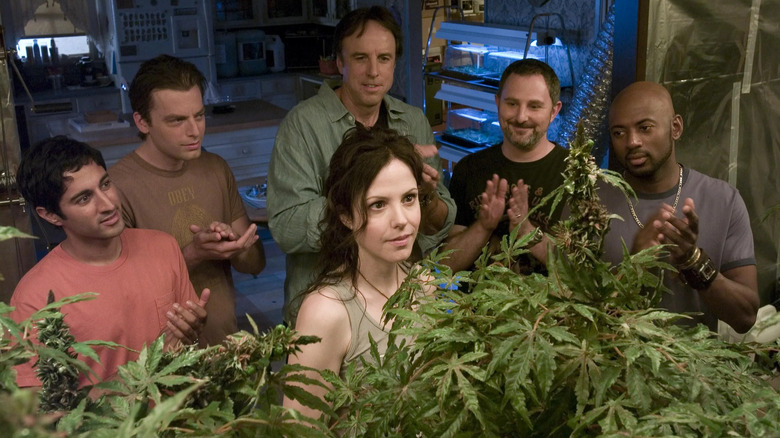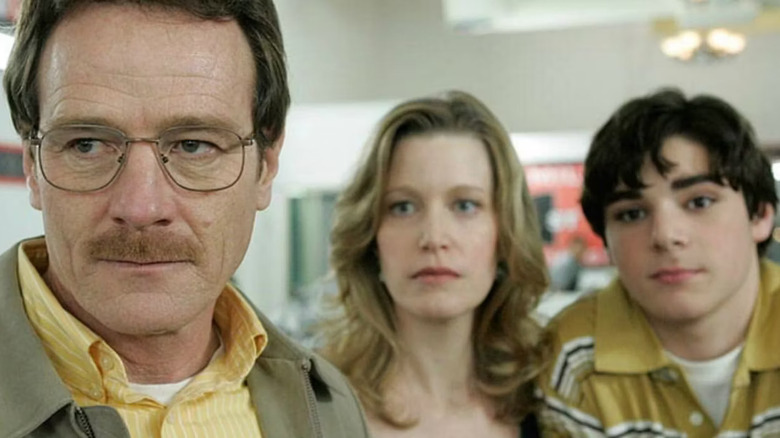Breaking Bad Almost Didn't Happen Because Of Weeds
As the saying goes, imitation is the sincerest form of flattery. But that's not necessarily the case if you're in the middle of a studio pitch meeting. In that case, imitation might leave you quite embarrassed. That was the situation "Breaking Bad" creator Vince Gilligan found himself in when trying to sell networks on the series.
In 2005, Gilligan came up with the concept for "Breaking Bad." The germane of the idea was that a science teacher and cancer patient in need of money for treatment would use his chemistry knowledge to cook and sell meth. Gilligan pitched the idea to Sony Television, who liked the idea.
But when they went looking for a network, things got a bit dicey. That same year, Showtime debuted a show about a drug-dealing suburbanite and the family drama surrounding her. Gilligan was left to let the drugs do the talking, as Sony executives pontificated on the differences between marijuana and meth.
'This sounds a lot like Weeds'
About five minutes into a passionate 30-minute pilot pitch for "Breaking Bad," Gilligan was interrupted by a network president telling him, "This sounds a lot like 'Weeds.'" Gilligan recalled the moment in an article written for Newsweek. He wrote:
"Hearing this, I could feel the blood drain from my face. I turned to [Sony executives] Zack [Van Amburg] and Jamie [Erlicht]. 'Did you know about 'Weeds?' 'Oh, yeah,' they said. 'Great show. But your thing is completely different. She deals pot and your guy deals crystal meth. Apples and oranges.'"
Gilligan, who had no knowledge of Showtime's "Weeds" until that meeting, described the differences between the two show's subject matter as "psychopharmaceutical equivalents of Greek comedy and tragedy masks." And though both shows do involve everyday protagonists selling drugs as a means to an end, they are very, very different from each other.
In "Weeds," Nancy Botwin (Mary Louise Parker) is widowed, left to raise two sons on her own. To keep her home and continue their upper-middle-class suburban lifestyle, she deals marijuana. The stakes are low, with Botwin taking an illegal shortcut for financial gains rather than turning to a legal form of income.
"Breaking Bad's" Walter White (Bryan Cranston) faces a more dire situation, as he has terminal lung cancer and a son with cerebral palsy. He turns to meth production as a way to provide for his family after his impending death. Though its legality wasn't as prevalent when "Weeds" was produced, recreational marijuana is now legal in nearly half the country. Fifteen additional states allow the medicinal use of the drug. Meth as a street drug remains an illegal and dangerous drug and continues to be an epidemic in rural communities in the U.S.
Two very different 'dark comedies'
AMC, the network that picked up "Breaking Bad," had faith in its contrast to "Weeds." Though both shows are described as dark comedies, they are quite different thematically. Given the type of drug and low stakes facing the Botwin family, "Weeds" is an airy drama and satire of modern suburban life. Though the family gets caught up in quite a bit of illegal activity, it is typically of their own doing rather than being forced into anything.
As the seasons progress, the Botwin antics get more outrageous. One family member joins a rabbinical school to avoid being drafted into the military. Artificial tension is created when Nancy Botwin dates a DEA agent. After the first three seasons, dramatic time and location jumps seem to be made in a desperate effort to keep the series fresh.
"Breaking Bad" is dark, and the comedy increasingly drains from it as the series bores on, replaced by unadulterated tension. Walter White quickly begins spiraling, ensconced in crises out of his control. He's forever trapped between necessity and integrity. White is an increasingly complex character. Though he begins his illicit affairs for family, they morph into a soul-crushing exploration of the self. His relationships are intense and dynamic, changing wildly from season to season.
Though Gilligan might have felt panic the moment he learned about "Weeds," he went on to create a pop culture phenomenon that led to 16 Emmys (and 58 nominations), a movie ("El Camino: A Breaking Bad Movie"), and a spinoff series ("Better Call Saul"). In the end, Gilligan's Sony execs were right all along. The two shows are very much apples and oranges ... or perhaps the better analogy is marijuana and meth.


